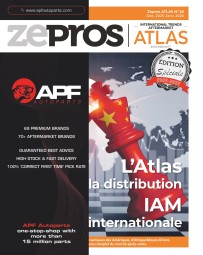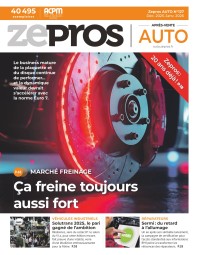
M. Blinston, BM Catalysts: “Our supply chain is now very fluid in continental Europe”

The effects of Brexit and new export rules have obliged this UK manufacturer to rethink its logistics. Its new process has brought it into line with industry delivery standards. British manufacturer's commercial director explains.
Mark Blinston: We expect our turnover to have increased significantly through our international sales. Like in France, where our turnover has gone up a lot.
M. B.: We are budgeting for more growth. New markets are emerging where enhanced emissions testing is being introduced to established markets. We are also growing our distribution network every month.
M. B.: We focus on hot end emissions products. This includes catalysts, diesel particulate filters (DPFs), selective catalyst reduction units (SCRs), pipes and the recently introduced gasoline particulate filters (GPFs). Furthermore, we also offer a range of particulate filter pressure pipes as well as a complete range of mounting kits.
M. B.: We launched 14 gasoline particulate (GPF) references, along with 35 references dedicated to the Euro 6 fleet covering over 13 million vehicles in Europe (catalytic converters, diesel particulate filters (DPF) and a selective catalytic reduction (SCR) reference). And for 2025, we are expecting to launch lean NOx traps and ammonia slip catalysts.
M. B.: We simply wanted to improve our industrial assets because of our growth. We were in need of more space for stock and manufacturing. Hence the newly acquired facility, which currently covers 3,800 sqm, but once we have completed the building work, it will span more than 10,000 sqm of floor space. This new building will help us increase our manufacturing rate and continue to produce 300 new-to-range parts every year. This will mean we will be able to increase our stocks from 60,000 to 80,000 parts, covering 90% of the European vehicle fleet. I should add that the warehouse is strategically located next to BM Catalysts’ Fulwood Rise manufacturing facility in North Nottinghamshire.
M. B.: We have improved our logistics in Europe. We are working very hard to make the process as fast as possible. Our stock is therefore higher than ever (over 80,000 items in stock), which means we can ship orders faster than ever. In addition, we now have an organized flow through a facility in Belgium. Our logistics are therefore very fluid now. For example, from our factories, all located in Great Britain, deliveries to France are made in two to three days. That’s quite a feat, considering how complex Brexit made things! In addition, our service level is excellent. Having an effective supply chain is particularly crucial when you consider that over 60% of our production is exported to mainland Europe.
M. B.: France, Germany, Italy and Spain. On all these markets we are aggressively expanding our market share. It’s worth noting that the countries that now have legislation on diesel particulate filters, such as the Netherlands, Belgium, Germany and Switzerland, generate the strongest growth for BM Catalysts. More generally, Poland, Germany, France and the Scandinavian countries are growth markets for us.
M. B.: We’re always looking for additional distribution points everywhere! Our goal is to be distributed in all the big cities of the main European countries, and we won’t stop until we’ve reached that goal.
M. B.: We do sell our products across a number of countries outside Europe. But these are mainly areas with a sizeable car parc, and where there are emissions regulations in place similar to those in Europe.
M. B.: Our market, revolving around the maintenance of internal combustion cars, is going to grow very quickly from now until electric cars take over. So we tell every distributor that there is no need to be afraid that this is a dying market. We still have a good twenty years before the transition will impact our industries. However, should electric technologies indeed take over, which I highly doubt, our exhaust product will gradually disappear. Between now and that time, vehicles have more and more complex emissions systems. And these will need repairing and replacing! Legislation will continue to be introduced to make sure the combustion engine vehicles that remain are as clean as possible. This is all good news for our sector, and in particular for the aftermarket.









